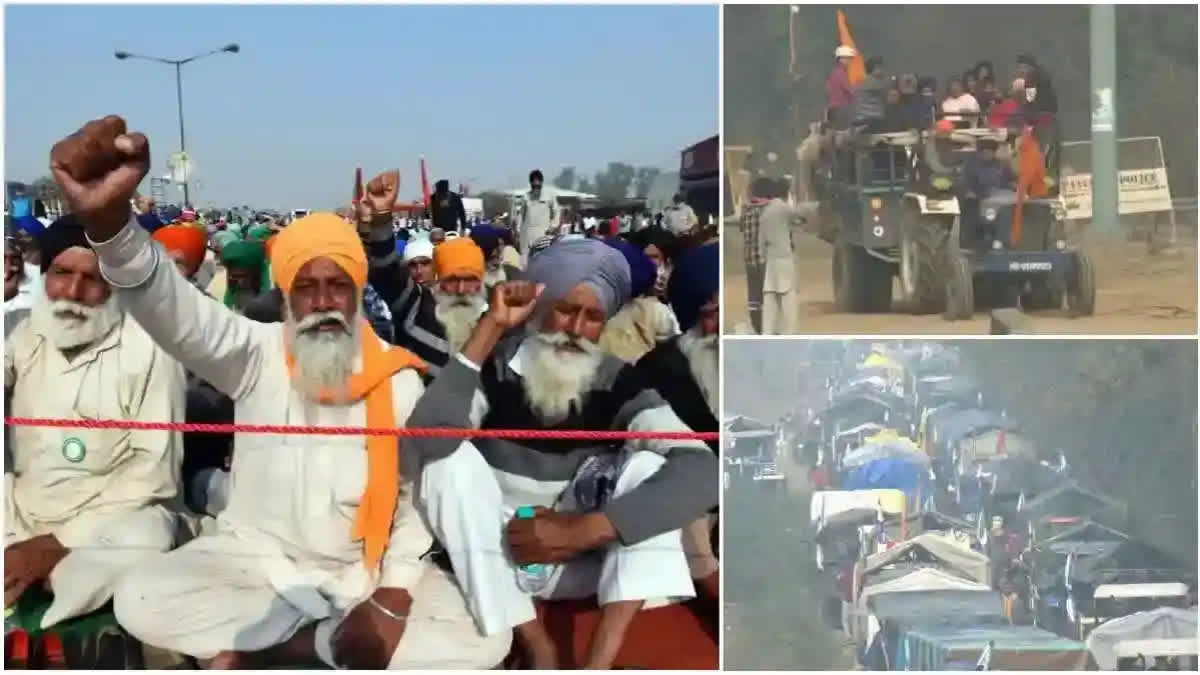Chandigarh/New Delhi:Farmers from Punjab clashed with Haryana Police at two border points between the states on Tuesday, facing tear gas and water cannons as they tried to break past barricades blocking their protest march to the national capital. Twenty-four police personnel, including a deputy superintendent of police, were injured as protesters hurled stones at them, officials said.
Farmer leaders said police also fired rubber bullets, and claimed over 60 protesters were hurt in the attack on them at Shambhu border, close to Haryana's Ambala city. Police used tear gas and water cannons against the protesters at the border in state's Jind district as well. According to police, nine of their men suffered injuries in this clash at Data Singhwala-Khanauri border.
In the evening, after a face-off with police that lasted several hours, farmer leaders called off the protest for the day. They said they would resume the march from Shambhu on Wednesday. The Samyukta Kisan Morcha (Non-Political) and the Kisan Mazdoor Morcha are spearheading the Delhi Chalo' agitation to put pressure on the Centre for their demands, including a law on minimum support price for crops and loan waivers.
In an interview with PTI, Union Agriculture Minister Arjun Munda, however, said a law guaranteeing MSP cannot be brought in a hurry without consulting all stakeholders. He urged farmer groups to have a structured discussion with the government on the issue. Munda and Union Food and Consumer Affairs Minister Piyush Goyal had held last-ditch talks with farmer bodies in Chandigarh on Monday night. But the five-hour meeting remained inconclusive.
The Punjab and Haryana High Court on Tuesday issued notices to the Centre and the states of Haryana and Punjab, on two petitions. One of them sought directions from the court to stay all "obstructive" actions by the two state governments and the Centre. The other pleaded for directions to ensure no highway is blocked by the protesters.
The march began around 10 am from Punjab's Fatehgarh Sahib, about 40 km from the Haryana border as farmers, including women, packed themselves in tractor-trolleys. An excavator was a part of one convoy, with a farmer in Amritsar saying it would be used to break barricades.
Police barriers have been put up at several places in BJP-run Haryana on the highway to Delhi. And at major entry points to the capital, the Delhi Police has installed layers of barriers that include barbed wire, concrete slabs and tyre-bursting strips on the road. The fortification of Delhi reminded many of the farmers' agitation for the repeal of the Centre's agri-marketing laws in 2021. The protesters had then blockaded the main roads leading into Delhi for months.
Though the protesters were nowhere near the city, traffic crawled at a snail's pace at many places in the Delhi-NCR region because of the barricades regulating access to key roads. This was apart from the barriers at Singhu and Tikri borders. On Tuesday, there was no significant movement by Haryana farmers to join the march.
